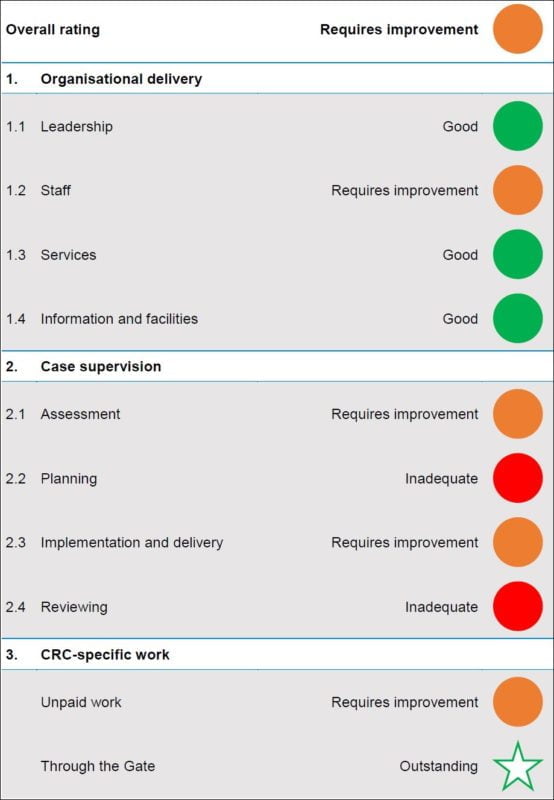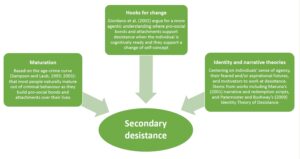Service improving but still not good enough
A Merseyside probation service must do more to raise the standard of its work, according to an inspectors’ report published today. HM Inspectorate of Probation conducted a routine inspection of Merseyside Community Rehabilitation Company (CRC) in January and February before the Covid lockdown. Inspectors looked at 10 aspects of the CRC’s work and gave an overall rating of ‘Requires improvement’.
Chief Inspector of Probation Justin Russell said:
“We last inspected Merseyside CRC in June 2018. It is disappointing that the overall rating has stayed the same.
This CRC has strong leadership, committed to improvement which has made considerable efforts to follow up recommendations from our previous inspection. The delivery of unpaid work and Through the Gate support for those leaving prison have both improved.
However, the overall quality of probation supervision has declined since our last inspection, particularly in relation to safety. We were also concerned by the CRC’s lean resourcing and the way it allocates some cases.”
Merseyside CRC is run by the Purple Futures consortium of private and third-sector businesses. The CRC supervises more than 6,200 low and medium-risk offenders across Liverpool, Knowsley, St Helens, Sefton and Wirral. Some individuals are serving community sentences; others are preparing to leave or have left prison.
As part of the fieldwork, inspectors examined a sample of cases. Domestic abuse was a feature in around a third of cases and child safeguarding was a concern in around a quarter of cases.
Mr Russell said:
“Probation services must strike a balance between supporting rehabilitation and protecting the public. In too many of the inspected cases, there was insufficient work to identify and manage the potential risk of harm.
Probation staff should work closely with agencies such as the police and children’s social care services to consider all the available data and glean intelligence.
They should consider the individual’s previous offending history, as well as the latest offence that has led to their supervision. Deeper analysis will give a more rounded picture of the potential risks and help to protect victims.”
Inspectors concluded Merseyside CRC’s resourcing was “extremely tight”. High levels of staff sickness – an average of 17.5 days per year – put remaining colleagues under extra pressure.
Probation staff should be allocated cases that they can manage safely. Inspectors were concerned by the CRC’s case allocation process, which did not always take into account the level of risk of harm that individuals can pose. As a result, 40 per cent of interviewed staff said they were not always allocated cases that matched their skills, experience and training.
Inspectors found the quality of work was noticeably better at the Prescot site. The management of cases was largely good at this unit, particularly its work to keep others safe. The Inspectorate has urged Merseyside CRC’s leaders to take a closer look at the site to understand why it is performing differently and to replicate its success across the whole region.
The strongest area of performance is the Through the Gate service, which supports people as they prepare to leave prison and resettle in the community. The Inspectorate has rated this element as ‘Outstanding’ – up from ‘Requires improvement’ last time.
Central government gave the CRC additional funding for this work, which has increased staff numbers. Inspectors also cited excellent support to help individuals find appropriate accommodation, delivered in conjunction with Shelter.
Key findings
Inspectors organised their key findings under three main headings: organisational delivery; case supervision and unpaid work & through-the-gate.
Organisational delivery
Inspectors’ main findings on this domain were positive although there was concern about staffing levels. Inspectors found that the CRC has a clear strategic approach to developing a strengths-based service that focuses on the needs of service users and is designed to keep people safe. There has been a clear focus on our recommendations from the last inspection, with particular emphasis on staff development and training. Delivery across Merseyside reflects local need and is enhanced by excellent relationships with local partner agencies and stakeholders across the region. Key strengths of the organisation are as follows:
- Senior leaders have a strong presence in the organisation and are committed to improving the quality of performance.
- There are excellent strategic relationships with partner agencies, and the organisation is active in both influencing and driving initiatives to bring about improvements in provision.
- The CRC has a good understanding of reoffending and the profile of the service user population to drive service delivery.
- There is a good range of interventions, delivered directly by the organisation and through partner agencies, which are appropriately targeted.
- There is a good focus on staff development and training, with particular focus on issues relating to keeping other people safe.
- Premises across Merseyside CRC are good and accessible to both staff and service users.
The main areas for improvement are as follows:
- The lean resourcing model and high levels of sickness mean that many case and senior case managers have workloads above the organisation’s own workload measurement tool target.
- The reason why Prescot LDU performs substantially better than the other two LDUs of Wirral and Liverpool and Sefton needs to be explored so that Prescot’s good performance can be replicated elsewhere.
- Case allocation and appropriate safeguards need improving to ensure cases are always allocated to the right case/senior case manager.
- The reason why training has not had a greater impact on service delivery needs to be understood in order to improve performance.
- Quality assurance and staff development require greater and more consistent input from middle managers, and the organisation needs to explore how the oversight of case management can improve, especially in relation to work to keep other people safe.
- Operational work by case and senior case managers with partner agencies involved with service users, particularly with regard to all aspects of safety, Requires improvement.
Case supervision
Inspectors were critical about the core probation task of supervising offenders with all four inspected domains rated as sub-standard.
Key strengths of case supervision are as follows:
- Responsible officers were good at identifying individuals’ offending-related factors and the strengths and protective factors that should help them desist from offending.
- Responsible officers were generally good at involving service users in creating their plans.
- The sentence or post-custody period was usually implemented appropriately.
- Responsible officers often made good efforts to enable service users to complete their sentences.
Areas of case supervision requiring improvement include:
- Too often, safeguarding and domestic abuse factors were insufficiently identified or analysed, often because other available information was not considered.
- Insufficient account was taken of individuals’ personal circumstances and diversity factors in relation to planning.
- In too many cases, targets set in plans were too broad or general to be useful.
- In too many cases, there was insufficient contact for it to be useful in managing risk of harm.
- Engagement of and coordination with partner agencies, particularly those engaged in keeping other people safe, require greater attention.
- Reviews took account of possible barriers to engagement or resulted in sufficient adjustments to plans in too few cases.
Unpaid work and through-the-gate
- Most service users see the benefit to the community of the unpaid work they undertake, and many appreciate the positives they gain from work experience.
- In a good number of cases, work was allocated appropriately to service users.
- There is a good range of both group and individual placements; in particular, a female-only group offers a positive alternative to individual placements.
- The vast majority of unpaid work begins promptly after sentencing.
- Unpaid work provision is flexible to accommodate the individual work or personal needs of service users.
Areas for improvement of unpaid work are:
- The CRC needs to give greater attention to how personal circumstances and diversity are likely to impact on engagement.
- There is insufficient use of ETE and too few service users understand what is available and how to access it.
- Risk assessments do not sufficiently take account of the potential harm that individuals pose, and in too many cases information that is known is not explored adequately.
- There is room to improve adherence to rules on some unpaid work placements.
Key strengths of through-the-gate are:
- Assessments of resettlement need are generally good, with appropriate consideration given to the needs of individuals and the potential risk of harm they pose, regardless of how long they are in custody for.
- Accommodation support, provided by Shelter as part of the Through the Gate service, is good and offers sufficient support in over 90 per cent of the cases requiring it.
- Communication with community-based responsible officers ensures effective transition from prison to the community to offer continuity of support.
- Information shared by Through the Gate staff to responsible officers often includes information regarding the service user’s wider behaviour in order to help understand a wider context of need.
Areas for improvement of Through the Gate are:
- There is scope to further improve communication with departments that offer support not provided by the Through the Gate team.
- The lack of interview space in some cases meant it was not always possible to discuss private matters that had a bearing on resettlement planning.
Conclusion
The Probation Inspectorate works on a four-band rating system: excellent, good, requires improvement and poor. While it is pleasing to see Merseyside CRC make improvements to performance even during a time when they know that the CRC will be wound up over the next year, it remains disappointing that the service is still rated as “requiring improvement”.
Nevertheless, Merseyside has now achieved 15 points in my unofficial probation league table, when it had previously scored just 13.









